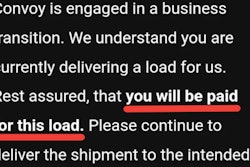Trucking news and briefs for Wednesday, March 6, 2024:
Florida passes predatory towing reform bill
With unanimous votes in the Florida House and Senate, the Florida Legislature has passed significant predatory towing and recovery reform legislation that is now headed to the desk of Gov. Ron DeSantis.
House Bill 179, led by State Rep. Melony Bell and State Sen. Keith Perry, was a multi-year effort to enact meaningful reforms to the towing and recovery business in Florida.
Florida Trucking Association President and CEO Alix Miller called the bill’s passage "a huge victory for trucking in Florida, the trucking industry nationally, who have seen invoices as high as $200,000, and the motoring public, who fall victim to predatory towing companies.”
HB 179 will require towing and storage operators to maintain a rate sheet listing all fees related to vehicle or vessel recovery, removal, or storage. They must post this rate sheet at their place of business and provide it upon request to vehicle or vessel owners, lienholders, insurance companies or their agents.
Additionally, before attaching a vehicle or vessel to a wrecker, the tow operator must furnish the rate sheet to the owner or operator being towed, if present. Any fee charged beyond those listed on the rate sheet will be considered unreasonable.

[Related: How truckers can beat predatory towing: Egregious bills, practices, more]
“The final bill includes some significant new requirements for the establishment and publication of rates," Miller added, "requirements for detailed and itemized invoices, a requirement for towers to accept multiple payment options, and a new dispute resolution process for consumers and carriers to challenge excessive fees.”
The bill also attempts to help in situations when carriers have problems recovering personal property and undamaged trailers that have been towed and stored. In these instances, the inspection and release of the vehicle, vessel, trailer or personal property must be permitted within one hour and during normal business hours at the site where the vehicle, trailer or vessel is stored. The operator must accept government-issued photo identification and cannot require additional forms of identification to access and/or release the vehicle.
“The towing and recovery industry is vital to the Florida trucking industry, and we’re grateful to have many as members of FTA and for their input in the legislation,” Miller said. “HB 179 will weed out the predatory towing tactics of bad actors and make the entire industry better and safer.”
If approved by DeSantis, the law will become effective on July 1, 2024.
[Related: DOT's Buttigieg, FMCSA call out predatory towing, propose penalties]
Texas suspends trucking regs for wildfire response
The largest wildfire in Texas history, which has burned more than 1 million acres as of Wednesday, has prompted Gov. Greg Abbott to issue an emergency declaration, waiving several regulations for truck drivers and carriers responding to the blaze.
The emergency declaration was issued last week for 60 counties across the Panhandle and South Plains regions into the Permian Basin and West Texas, which can be found in the declaration.
Following the declaration, Abbott granted waivers to help in the wildfire response. As such, he directed the Texas DMV to temporarily suspend interstate vehicle registration, 72-hour and 144-hour temporary registration permitting, and oversize and overweight permitting.
The Texas Department of Public Safety was also directed to temporarily suspend rules related to carriers conducting response and recovery efforts to wildfires, allowing additional hours without violating federal regulations and enhancing efforts for lifesaving measures to be taken by motor carriers.
Examples of disaster assistance, according to the Texas DMV, include but are not limited to vehicles engaged in the transportation of relief workers, food, hay, water, clothing, equipment, medical supplies, materials, fuel, shelter, and other supplies to the disaster areas, as well as vehicles used to restore utilities and to remove debris from the disaster areas listed in the disaster declaration.
Operators utilizing the waivers are required to carry a copy of the Texas DMV waiver, as well as the governor’s emergency declaration.
[Related: FMCSA revokes five more ELDs, as owner-op seeks mandate waiver]
Bill introduced to extend weight limit waivers during emergencies
U.S. Representatives Dusty Johnson (R-South Dakota) and Jim Costa (D-California) recently introduced the Modernizing Operations for Vehicles in Emergencies (MOVE) Act. The Act seeks to expand the circumstances under which the federal government would allow a state to waive federal weight limits on the interstate system to include declarations by governors regarding disease and otherwise challenging supply chain conditions.
In times of emergency or disaster, states have the authority to waive federal weight limits on the interstate system, allowing the expeditious delivery of relief supplies. Waivers are similarly used during natural disasters to provide much-needed relief supplies to impacted communities.
Under current law, special permits may be issued if the President has declared the emergency to be a major disaster under the Robert T. Stafford Disaster Relief and Emergency Assistance Act. Many emergencies that require shipper flexibility, though, do not meet that standard. That included COVID-19, which didn’t meet that test. Legislation was needed to grant flexibility.
The MOVE Act modernizes the authority for vehicle weight waivers in cases of natural disasters, disease, and other emergencies that negatively impact commerce and supply chains. In addition to expanding the circumstances under which state officials can waive limits, the legislation would also allow emergency declarations to remain in effect for 270 days to allow for time needed to respond to emergencies and challenging conditions, compared to the 120-day maximum under current law.
“When hospitals and nursing homes are low on medicine, families are running out of food and water, and electricity is nonexistent, the last thing communities responding to natural disasters should have to worry about is bureaucratic red tape delaying truck drivers from moving relief supplies as quickly as possible,” said American Trucking Associations President and CEO Chris Spear. “We commend Congressman Johnson on introducing this commonsense measure that will allow trucks to expedite the delivery of relief wherever and whenever it is needed.”
[Related: The COVID hours waiver should open the door for more HOS flexibility]
New pilot program launches for electric-truck rentals at SoCal ports
Two Class 8 Volvo VNR Electric trucks will be utilized to launch the pilot ONE Electric Truck Program, which offers small drayage fleets in Southern California a three-month lease on the zero-tailpipe-emission Volvo VNR Electric trucks.
The ONE Electric Truck Program was developed by Ocean Network Express (North America) Inc. (ONE), a global container shipping company that services the Ports of Los Angeles and Long Beach. The goal is to facilitate the transition to electric trucks for small drayage fleets, essential to port operations.
Volvo Trucks North America customer BoxLinks (member of LX Pantos) is ONE’s regional partner and purchased the two Class 8 Volvo VNR Electric trucks. BoxLinks will manage the leasing contract and operations on the program that will provide small fleets the opportunity to experience the benefits of the battery-electric truck and determine if it is an operational fit for their fleet prior to making a purchase decision.
[Related: Electric trucks don't stand a chance, even in drayage, without more power infrastructure]
The ONE Electric Truck Program will manage short-term rentals of electric trucks that are inclusive of charging, insurance, and the vehicle lease agreement. The package is designed to make the transition as seamless as possible for both independent operators and small fleets, Volvo said. Maintenance will be handled by Volvo Trucks Certified Electric Vehicle Dealer TEC Equipment – La Mirada, and covered under the Volvo Gold Contract.
This new program will deploy two enhanced Volvo VNR Electric trucks that feature a six-battery pack configuration with a total battery capacity of 565 kWh. The battery-electric truck offers up to a 250kW DC charge rate that can achieve an 80% charge in about 90 minutes.
The two Volvo VNR Electric trucks were funded in part by CARB’s Hybrid and Zero-Emission Truck and Bus Voucher Incentive Project (HVIP).
[Related: Electric-truck purchase incentives present big challenges for owner-operators, small fleets]











